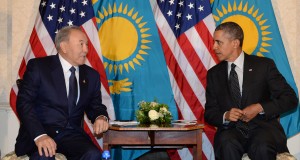 THE HAGUE – President Nursultan Nazarbayev of Kazakhstan met with President Barack Obama of the United States on March 25 on the sidelines of the third Nuclear Security Summit here to discuss bilateral relations and international issues, paying particular attention to nuclear security.
THE HAGUE – President Nursultan Nazarbayev of Kazakhstan met with President Barack Obama of the United States on March 25 on the sidelines of the third Nuclear Security Summit here to discuss bilateral relations and international issues, paying particular attention to nuclear security.
Speaking about bilateral cooperation, the two leaders considered further strengthening and developing relations in trade and economic cooperation.
President Nazarbayev noted that nearly 300 joint ventures involving U.S. business enterprises are operating in Kazakhstan, demonstrating the two countries’ dynamic cooperation.
As the U.S. is one of the largest investors in Kazakhstan, the Kazakh president stressed that Astana is interested in more active participation by U.S. companies in the State Programme of Accelerated Industrial and Innovative Development (SPAIID).
The agenda of the talks, which took place at the U.S. embassy in The Hague in the presence of top political and trade officials from both countries, also included Kazakhstan’s accession to the World Trade Organisation (WTO) and other topical international issues.
Addressing nuclear security, President Obama emphasised Kazakhstan’s invaluable contribution to nuclear disarmament and stressed that the country is an example for all states in this sphere. He also thanked Kazakhstan for its assistance in stabilising the situation in Afghanistan.
According to the Joint Statement on Cooperation in the Sphere of Nonproliferation and Strengthening Nuclear Security issued following the meeting, Kazakhstan and the U.S. have once again confirmed a shared commitment to nonproliferation and strengthening nuclear security.
The document states that the two countries note with satisfaction the successful efforts of the U.S. Defence Department’s Cooperative Threat Reduction Programme, which supports nonproliferation activities in the former Soviet Union, and will continue to strengthen physical security at the former Semipalatinsk Test Site.
In order to prevent illicit trafficking in nuclear and radiological materials, the U.S. will continue to partner with Kazakhstan in developing a Nuclear Security Training Centre (NSTC). Both countries will construct and equip the NSTC as well as develop curricula for physical protection and material control and accounting specialists. The project is expected to be completed before the end of 2015, the statement says.
Since 2006, the U.S. has been working closely with the Kazakhstan Customs Control Committee (KCCC) to install radiation detection equipment at ports, land border crossings, airports and other international points of exit and entry. To date, radiation detection systems have been installed at 29 sites.
The statement also expresses support and gratitude for Kazakhstan’s recent measures to eliminate its highly enriched uranium (HEU), particularly at its VVR-K research reactor at the Institute of Nuclear Physics (INP). HEU there was downblended to low enriched uranium (LEU) fuel and HEU spent fuel was removed from the reactor. The countries will continue to work together to convert Kazakhstan’s remaining HEU reactors to LEU fuel as soon as technically feasible, the statement says.
Thirty-three kilogrammes of HEU have recently been downblended in Kazakhstan, and the two countries have cooperated to remove and ship approximately 600 kilogrammes of HEU from Kazakhstan to the U.S. Almost 75 kg of HEU spent fuel have been returned to Russia in recent years. The next shipment will take place in late 2014 from the Institute of Nuclear Physics in Alatau.
The U.S. has also worked with Kazakhstan to complete the transportation of 10 metric tons of HEU and three metric tons of plutonium, enough to make 775 nuclear weapons, to the northeastern part of the country.
Taking into account Kazakhstan’s vast experience in handling such materials, the U.S. voiced support for the country’s endeavour to host the International Atomic Energy Agency’s LEU Bank, considered to be a nonproliferation effort to provide safe access to low-enriched uranium. During the summit in The Hague Kazakhstan announced that it was nearing completion of talks with IAEA over a relevant host country agreement.
“The United States of America supports the efforts of the Republic of Kazakhstan to host the IAEA LEU Bank, establish a Regional Nuclear Security Training Centre, and strengthen its emergency preparedness, response and mitigation capabilities,” the statement reads.
